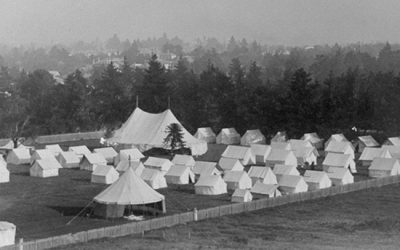For Seventh-day Adventists, sharing a Sabbath meal with friends and family is one of the most special and memorable parts of the Sabbath.
That’s why we want to share with you all about Sabbath meals and why they’re such a valued tradition in the Seventh-day Adventist church. We’ll answer questions like:
- What makes a Sabbath meal special, or different from other meals?
- Are there any Sabbath meal traditions?
- What does Sabbath meal preparation look like?
So let’s sit around the proverbial table and learn everything there is to know about Sabbath meals.
What makes a Sabbath meal special?

Photo by National Cancer Institute on Unsplash
Take a moment to remember some of your happiest memories: when you were at a special event, or with people that meant a lot to you, or a time when you were able to relax after a hard week.
In those memories, was food involved?
Chances are, your answer is “yes!”
And it’s no surprise, since sharing food is one of the best ways to build and cultivate relationships with other people.
That’s why a large part of what makes a Sabbath meal special is that it’s on the Sabbath, a day when we have time to spend with others while enjoying the world God made for us.
During the week, we’re often so busy that we aren’t able to eat together with our families, friends, or fellow church members. However, because Sabbath is meant to be a day of rest, we can be intentional about sitting down to share a special meal with other people.
This time also means that we can connect with people we don’t usually see during the week. Extended family, friends, church members, or church visitors are just some of the people we might see across the table from us at a Sabbath meal.
Sabbath meals are probably more essential now than they have ever been. In our technology-driven and distraction-laden society, sometimes we forget to slow down and truly spend time with each other: parents with children, couples with each other, and friends and family in general.
Truly, Sabbath meals are where we can reconnect with each other and with our Savior.
In the Bible, we can see examples of Jesus sharing meals with others in order to connect with them as well.
Sabbath meals in the Bible
Jesus sharing meals with others is a common theme in the Gospels.
Sometimes the meals were simple like picking heads of grain in the fields with His disciples (Matthew 12:1-8). Other times they were extravagant, in the homes of wealthy members of society (Matthew 9:10-13). And other times, they were examples of Jesus’ love, mercy, and acceptance, and in turn, a way to share the gospel and Jesus’ gift of salvation (Mark 16:1; Luke 19:9-10).
Simple or extravagant, Jesus often connected with people over meals to share His mission on this earth with them.
One example was the Last Supper, right near the end of Jesus’ life and earthly ministry. During this Sabbath meal, Jesus exhibits one of the key features of sharing a meal with others: servant leadership.
Jesus takes the time to wash His disciples’ feet and show how we need to serve each other in the same way (John 13:12-15).
To Jesus, sharing a meal isn’t just about eating food in the presence of other people. It’s also about serving one another and letting that deepen your relationships.
Sharing a Sabbath meal together is also about remembering that God is our provider. The feeding of the 5,000 in the Bible is a good example of this.
When the disciples wanted to send the multitudes home because they were hungry, Jesus showed the disciples that He can provide for all. He blessed a small child’s contribution of 5 loaves of bread and 2 fish and fed 5,000+ people with it (Matthew 14:13-21).
We can use Jesus’ practice of service and His ability to provide for us as a model for our own Sabbath meals as a way to show love to others and to show God that we trust Him. Of course, the way that we do that changes from family to family.
So let’s talk about some of the traditions Adventists might follow to make Sabbath meals special.
What are some Sabbath meal traditions?

Photo by fauxels
The fun thing about Sabbath meal traditions is that they are different for everyone. The Adventist Church is a global community, so one Sabbath meal might look totally different from another.
Some people eat similar things every week. Some families may have a type of soup and bread every Friday night, and some type of pasta at Sabbath lunch.
For others, they might try something new or exciting every week.
Sometimes, people prefer these meals to be formal, at a nicely-set table to make things extra special. Others might choose to keep things casual, modest, or low-key, even packing a picnic to eat outside in God’s nature.
While these traditions vary from family to family, there are some traditions that are common for many Adventists when it comes to eating together on Sabbath. Generally, Sabbath meals:
- Tend to be grander than other meals during the week
- Include a wider circle of people than the weekday meals, such as:
- Friends
- Extended family
- Visitors from church
- New neighbors
- A family who just moved to the area
- Give guests an opportunity to get to know a new group of people without the pressure or formality of a church service
Along with this theme, many Adventist Churches host Sabbath meals for the purpose of fellowship. Church members can bring dishes to share, making it an eclectic feast. These meals are called potlucks, or “fellowship dinner.”
Whatever Sabbath meal traditions people might choose to keep, the important parts remain: good food, quality time with people we love, and a reminder that God sustains and takes care of us.
Now that we know what kinds of traditions are common for Sabbath meals, let’s take a look at Sabbath meal preparation.
How Adventists prepare for a Sabbath meal
Meal prep for Sabbath can also vary from family to family.
We keep the way we approach Sabbath preparation focused on Jesus rather than following strict human-made guidelines for food preparation on the Sabbath (Matthew 12:1-8).

Photo by Jimmy Dean on Unsplash
Adventists don’t generally consider setting up the Sabbath meal as “work” because we consider work as things that are obligatory or vocation-related, not something done willingly and enjoyably to promote togetherness. So, for Seventh-day Adventists, serving a meal on the Sabbath isn’t a sin and isn’t wrong.
However, preparing for the Sabbath ahead of time means that the Sabbath day can be truly restful for everyone, so we often try to make food on Friday during the day, and leave the finishing touches for right before the meal.
Some ideas for Sabbath preparation include cooking ahead of time, freezing, and reheating on the Sabbath. Some might also use a slow cooker recipe to make things more effortless, and to be hot and ready at just the right time. These help keep us focused on God and keep our Sabbaths stress free!
Whenever that’s not possible—because sometimes life is busy and preparing ahead of time is difficult—Sabbath meals can also be simple and still be nourishing, and involve everyone’s help for cooking and cleanup.
Sabbath meals help us enjoy the blessings of Sabbath
However you enjoy your Sabbath meals—whether that’s preparing ahead of time and reheating food, joining with a church family at their home, eating the same thing every week, or eating something new every week—the best things about Sabbath meals are slowing down, spending time with people we love, and remembering how God sustains and takes care of us.
You can start your own Sabbath meal traditions today!
Find a Church
If you’re interested in finding a local Adventist church near you, you can use the Adventist Locator provided by the General Conference of Seventh-day Adventists.
Related Articles
More Answers
How Do Adventists Make Movie and Music Choices?
How do Adventists decide what music to listen to and which movies to watch? Learn how Bible principles can help us make better entertainment choices.
Does the Seventh-day Adventist Church Believe in Paying Tithe?
Seventh-day Adventists believe in paying tithe and offerings based on the biblical command and our commitment to being wise stewards of God’s resources. These donations help fund the mission of the Adventist Church by supporting pastors, missionaries, church expenses, and evangelistic projects, among other things.
Seventh-day Adventist World Population and Demographics
The Adventist Church has more than 22 million members and 100,000 churches worldwide, plus a large system of hospitals, schools, and publishing houses. Learn more about this diverse church.
What Is a Seventh-day Adventist Camp Meeting?
Although camp meetings didn’t begin with the Seventh-day Adventist Church, they’re as much an Adventist thing as haystacks.
Camp meeting is an extended event for Adventists (and non-Adventists) of all ages to gather and participate in spiritual seminars and activities. During the event, attendees often camp in tents, campers, or RVs.
How to Join the Seventh-day Adventist Church
Whether you heard about the Seventh-day Adventist Church through a traveling evangelist, during your online searches, or through a loved one or relative, you might be considering joining yourself.
How Do Adventists Do Baby Dedications?
For Christians, dedication ceremonies for babies, also for older children, are an important time for parents and the church. It’s a special part of the worship service when parents present their young children to God and the church family. Both parents, along with the congregation, regard this as a solemn promise to be a Christ-like example to the child.
Do Adventists Celebrate Communion and Foot Washing?
Like many Christian denominations, Adventists regularly participate in communion, also referred to as the “Lord’s Supper” or the “Last Supper.” They also practice foot washing (John 13:1-20), or the “ordinance of humility,” during the service—which isn’t as common.
What is the Concept of “Present Truth” and Why is it Important?
Present truth is the principle that certain biblical truths are relevant to God’s people at specific times in history. God sends the Holy Spirit to reveal truths that help us better understand how to interpret and apply His Word in a present moment.
Do Seventh-day Adventists Celebrate Easter
Yes, many Seventh-day Adventists do celebrate Easter.
Does the Adventist Church Have Youth Ministry Programs?
The Seventh-day Adventist Church has been organizing and operating youth ministry programs since 1879.
In our opinion, youth ministry is one of the most important ministries a church can have.
Do Adventists Celebrate Birthdays?
Yes, most Seventh-day Adventists do celebrate birthdays because we see them as excellent reminders of the life God has blessed us with. And we celebrate them the same way everyone else does—with friends, family, presents, and a special meal.
Sola Scriptura—What It Means and Why It Matters
Sola scriptura is a term that originated during the Protestant Reformation. It represents the way many Christians view the Bible and its authority. While the idea is simple enough, there is so much more to sola scriptura than its basic definition.
What Do Adventists Offer for Young Adults?
In recent years, the age group often classified as “young adults” has been trickier to engage. It’s been a significant concern for Christian churches around the world. Though interestingly enough, similar observations regarding young adults have been coming up in conversations about the economy, the entertainment industry, politics, and more.
Do I Need to be an Adventist to be Saved?
The answer to this question is simply, “no.”
When it comes to salvation in Jesus Christ, all that is required of a person is to acknowledge Jesus’ sacrifice for us, believe that He has saved us, and claim the free gift of salvation that is always available to us. Salvation is not based on denomination.
Do You Have to Be Vegetarian to Be Adventist?
Of course not. Membership in the Seventh-day Adventist Church has never included any dietary requirements. However, there might be some reasons people might think that. So many Adventists are vegetarians or even vegan, and a plant-based lifestyle has many health benefits.
All About Seventh-day Adventist Colporteurs
The Seventh-day Adventist Church uses a variety of methods to spread the hope of the gospel to the world. One of these ways is through colporteuring, also called “canvassing” or “literature evangelism.”
What Is an Adventist Book Center (ABC)?
When you walk into any one of the many Adventist Book Center (ABC) locations, chances are you’ll be greeted by pleasant gospel music in the background, friendly employees, and row after row of Christian books, movies, Bibles, study guides, kids’ games, and more.
Do Seventh-day Adventists Celebrate Holidays?
Wondering whether your Adventist classmate or coworker keeps the same holidays you do? Perhaps you want to include them in some festivities, but you also want to respect their beliefs. Thus, you’re unsure of how to navigate the holiday question. Will they accept your invitation to the office Christmas party?
The Adventist Haystack (It’s Not What You Think) + 4 Recipes
Haystacks are basically a taco salad—with an Adventist spin on it! Most versions are vegetarian and offer an endless combination of tasty toppings. We eat them often because they’re healthy, scrumptious, and easy to make.
Do Seventh-day Adventists Believe in Medical Care?
The Seventh-day Adventist Church believes in and supports evidence-based medical care. In fact, medicine has played a significant part in our history, and today we run a major health system with hospitals, medical schools, and clinics throughout the world.
Why do Adventists Emphasize Religious Liberty?
Adventists see religious liberty as an essential human right. After all, God endowed humanity with freedom of choice from the very beginning. So we believe it’s best for governments to also support their citizens’ rights to worship based on their convictions.
All about Adventist Elementary Schools
The Seventh-day Adventist Church operates the largest Protestant education system in the world. A big part of this system is our K-8 elementary schools, or primary schools, as they’re known in other parts of the world.
What Are Pathfinder and Adventurer Clubs?
Like the boy or girl scouts, Pathfinders and Adventurers learn about nature and life skills. But what makes these clubs special is their purpose to bring young people closer to Jesus.
13th Sabbath Offering: What It Is and Why It Matters
While the previous 12 Sabbaths of the quarter feature an established Adventist ministry and its current giving needs, the 13th is a rotating spot reserved for current mission projects.
A Look at Adventist Colleges and Universities
On the outside, Seventh-day Adventist universities may not look much different than other college campuses. But the real differences are beneath the surface.
What Is ASI (Adventist-Laymen’s Services and Industries)?
ASI, which stands for Adventist-laymen’s Services and Industries, is a membership-based organization that provides support for Seventh-day Adventist laypeople (Adventist professionals who aren’t pastors).
What Are Adventist Evangelistic Meetings?
The Seventh-day Adventist Church puts a huge emphasis on sharing the gospel through evangelism, or sharing the gospel through preaching, teaching, and testimony. One of the ways we accomplish this is by organizing public events called evangelistic meetings.
Christian Summer Camps—A Cherished Adventist Ministry
School’s out, the sun’s shining, and your kids are thrilled to have the summer ahead of them. Then three days in, you hear, “I’m bored…”
Do Adventists Have Their Own Bible?
Adventists have some unique beliefs—you might be able to name some of them right now. The seventh-day Sabbath. Death as a sleep. Hell as nonexistence.
Didn’t find your answer? Ask us!
We understand your concern of having questions but not knowing who to ask—we’ve felt it ourselves. When you’re ready to learn more about Adventists, send us a question! We know a thing or two about Adventists.


































